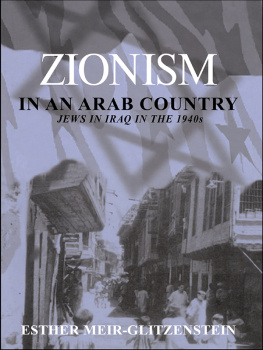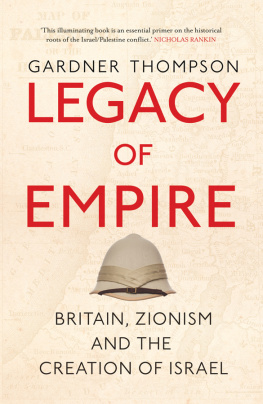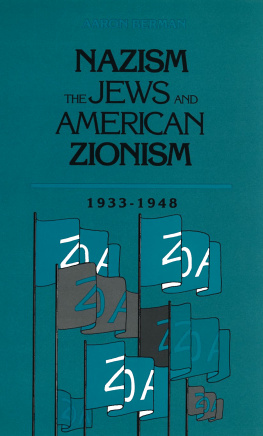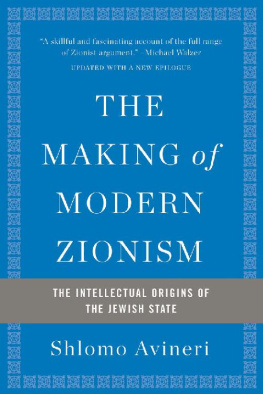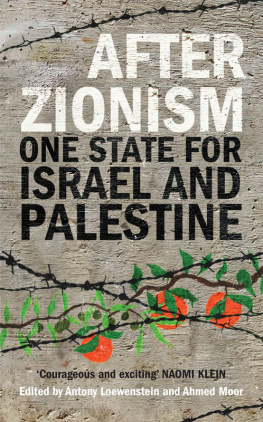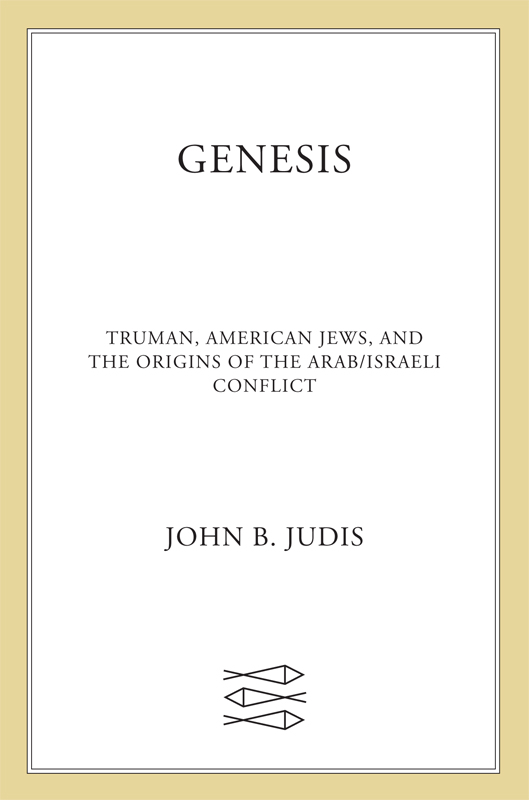
The author and publisher have provided this e-book to you for your personal use only. You may not make this e-book publicly available in any way. Copyright infringement is against the law. If you believe the copy of this e-book you are reading infringes on the authors copyright, please notify the publisher at: us.macmillanusa.com/piracy.
For my colleagues, past and present, at The New Republic
Are ye not as children of the Ethiopians unto me, O children of Israel? saith the Lord. Have not I brought up Israel out of the land of Egypt? and the Philistines from Caphtor, and the Syrians from Kir?
AMOS 9:7
CONTENTS
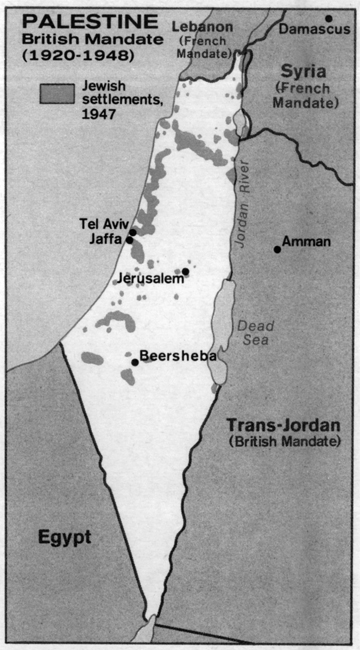
PALESTINE BEFORE THE UNITED NATIONS PLAN FOR PARTITION, 1947
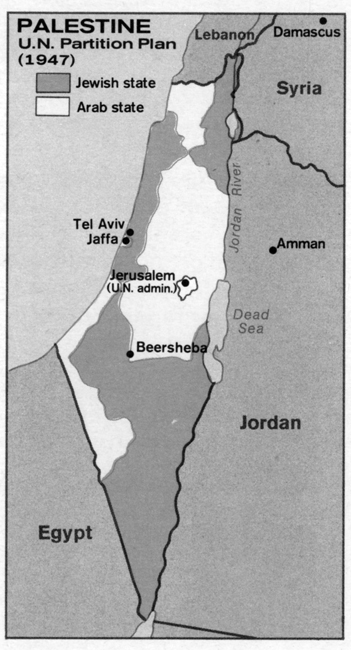
THE UNITED NATIONS PLAN FOR PARTITIONING PALESTINE INTO A JEWISH AND AN ARAB STATE, NOVEMBER 1947
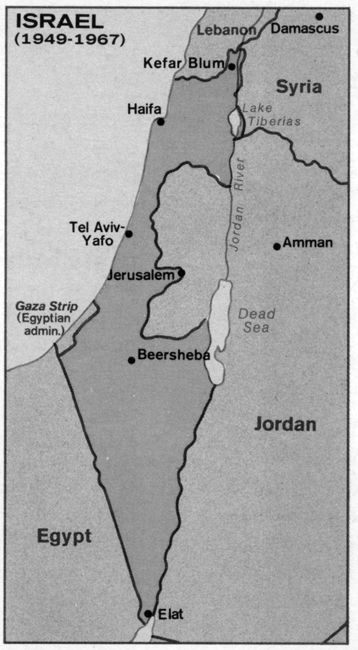
THE NEW STATE OF ISRAEL AFTER THE 1948 WAR AND THE 1949 ARMISTICE
INTRODUCTION: TRUMANS QUALMS
On Wednesday, September 8, 1948, Harry Truman was in a sea of troubles. He was in the middle of an election he was expected to lose; the Soviet Union was blockading Berlin; and, in the Middle East, Israel and five of its Arab neighbors were at war. That morning, Trumans first visitors in the White House were a delegation from the Jewish War Veterans of America, headed by Brigadier General Julius Klein.
It was supposed to be a routine fifteen-minute visita chance for the war veterans to invite Truman to their National Encampment in Monticello the next weekbut Klein surprised the president by presenting him with a long list of demands related to the new state of Israel. They included ending the arms embargo that the United States had imposed on all the combatants, granting Israel a $100 million loan to help it settle immigrants from Europes displaced persons camps, and championing Israels membership in the United Nations.
Truman was taken aback. As Klein later recounted, the president said, defensively, that he was the best friend the Jews had in America. And then he said something that clearly shocked Klein and the delegation. He complained to the Jewish War Veterans that he and British foreign secretary Ernest Bevin had agreed on the best possible solution for Palestine, and it was the Zionists who killed that plan by their opposition.
Truman was referring to the recommendations of the Anglo-American Committee, which came out in the spring of 1946, and to the plan negotiated by the American Henry Grady and the British official Herbert Morrison for implementing the recommendations. The committee called for allowing 100,000 Jewish survivors of Hitlers final solution, who were marooned in displaced persons camps, into Palestine. But it also recommended organizing Palestine into a federated state that would be neither Arab nor Jewish.
Klein reportedly left the meeting looking glum. One thing that must have bothered him was that, just four months before, Truman had recognized the new Jewish state of Israel. Now he was saying that the best possible solution had not been a Jewish state but a state that was jointly administered by Jew and Arab. And he was blaming Americas Zionists for blocking this solution.
* * *
Truman has sometimes been portrayed as a Christian Zionist whose decision to recognize Israel was in line with his own deepest convictions. But that is not reflected in his comment to Klein. Truman was a Jeffersonian Democrat who rejected the idea of a state religionstate religions were what had caused centuries of war in Europe. He didnt think that a nation should be defined by a particular people or race or religion. Far from being a Christian Zionist, Truman was deeply skeptical about the Zionist project of founding a Jewish state, as he repeatedly told Jewish leaders during his first year in office. He had personally overseen Henry Gradys work in developing the recommendations for a federated Palestine.
Truman backed down in October 1946 and supported a Jewish state in a part of Palestine. He did so to some extent, as he told Klein, because of political pressure from Zionist organizations. In the upcoming November elections, Truman feared that the Democrats could lose key races if the Jews, in response to attacks on Truman from the Zionist groups, voted for the Republicans. He also backed down because, with the Cold War beginning, he could not use American forces to help impose the kind of solution he and Bevin favored. After October 1946, Trumans wishes for a federated or binational Palestine found expression only in repeated private complaints to people like Klein.
* * *
Was Truman right in the first place to advocate a federated or binational Palestine? Truman was not insensitive to the plight of European Jews, who had lost 6 million to Hitlers final solution, and who had been, and still were, blocked from emigrating to Western Europe or the United States by draconian immigration laws. Truman had infuriated the British and Palestinian Arabs by insisting that the survivors of the Holocaust be allowed to emigrate to Palestine. But Truman also understood that Europes Zionist movement, beginning in the late nineteenth century, had been seeking to create a Jewish state in a land where another people had lived and made up the overwhelming majority for 1,400 years. Truman didnt know all the details of this history, but he knew enough of it to fear that establishing a state where either Jews or Arabs dominated would likely lead to war and injustice, so he sought to create a state with a federal arrangement that might satisfy the aspirations of both peoples.
After he gave up trying to impose a federated state, Truman continued to press for an equitable resolution to the conflict between the Arabs and Jews. His concern was partly strategic. He was worried, as was his State Department and Pentagon, about taking the side of the Zionists and alienating the regions Arabs at a time when the United States and its allies might need Arab oil to fight a war against the Soviet Union. But Trumans foreign policy views were grounded in personal morality. He saw the world divided between good guys and bad guys and between underdogs and bullies. He worried about fairness. He was outraged by what had been done to the Jews in Europe, but he was worried about a settlement that was unfair to Palestines Arabs.
In October 1947, when the United Nations was debating partition, Truman favored a division of Palestine that would give the Arabs, who still made up two-thirds of the population, a proportionate majority of the lands. After the wars of 1948, he favored a peace agreement between Israel and the Arab states that would at least restore the 40 percent of Palestine that the UN had earlier allotted to the Arabs and would allow many of the 700,000 Arab refugees displaced by the war to return to their homes. But Truman was beaten back in each instance by a powerful American Zionist movement working in tandem with the Jewish Agency in Palestine and later the Israeli government. In the end, the new Jewish state took up almost 80 percent of Palestine, and Palestines Arabs were dispersed and deprived of a state of their own. Europes Jews had been given their due, but it was at the expense of Palestines Arabs.


